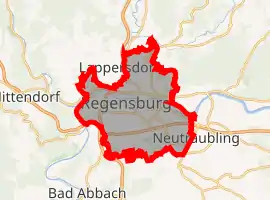Regensburg
Regensburg (German pronunciation: [ʁɛ:gənsbʊɐ̯k]; Czech: Řezno, Austro-Bavarian: [ʁɛŋsbʊɐ̯k]; Rengschburg or Rengschbuach [ʁɛŋsbʊax]) is a city in the south of Germany, in the east of the state of Bavaria. It has about 138,000 inhabitants and a university.
Regensburg | |
|---|---|
 | |
 Flag  Coat of arms | |
Location of Regensburg  | |
 Regensburg  Regensburg | |
| Coordinates: 49°1′N 12°5′E | |
| Country | Germany |
| State | Bavaria |
| District | Urban district |
| Subdivisions | 18 districts |
| Government | |
| • Lord mayor (2020–26) | Gertrud Maltz-Schwarzfischer[1] (SPD) |
| Area | |
| • Total | 80.76 km2 (31.18 sq mi) |
| Population (2021-12-31)[2] | |
| • Total | 153,542 |
| • Density | 1,900/km2 (4,900/sq mi) |
| Time zone | UTC+01:00 (CET) |
| • Summer (DST) | UTC+02:00 (CEST) |
| Postal codes | 93001–93059 |
| Dialling codes | 0941 |
| Vehicle registration | R |
| Website | www.regensburg.de |
| Official name | Old town of Regensburg with Stadtamhof |
| Criteria | Cultural: ii, iii, iv |
| Reference | 1155 |
| Inscription | 2006 (30th Session) |
| Area | 182.8 ha |
| Buffer zone | 775.6 ha |
Imperial City of Regensburg Reichsstadt Regensburg | |||||||||
|---|---|---|---|---|---|---|---|---|---|
| 1245–1803 | |||||||||
| Status | Free Imperial City of the Holy Roman Empire | ||||||||
| Capital | Regensburg | ||||||||
| Government | Republic | ||||||||
| Historical era | Middle Ages | ||||||||
• First settled | Stone Age | ||||||||
• Gained Reichsfreiheit¹ | 1245 | ||||||||
• City annexed by Bavaria | 1486 – 96 | ||||||||
• City adopted Reformation | 1542 | ||||||||
| 1663 – 1806 | |||||||||
• Mediatised to new Archbishopric² | 1803 1803 | ||||||||
| 1806 | |||||||||
| |||||||||
1: The Bishopric of Regensburg acquired Reichsfreiheit around the same time as the City. Of the three Imperial Abbeys in Regensburg, Niedermünster had already acquired Reichsfreiheit in 1002, St. Emmeram's Abbey did in 1295 and Obermünster in 1315. 2: The Bishopric, the Imperial City and all three Imperial Abbeys were mediatised simultaneously. | |||||||||
References
- Liste der Oberbürgermeister in den kreisfreien Städten, accessed 19 July 2021.
- "Tabelle 12411-003r Fortschreibung des Bevölkerungsstandes: Gemeinden, Stichtag" (in German). Bayerisches Landesamt für Statistik. June 2022.
- Book of Nature. World Digital Library. 20 August 1481. Retrieved 2013-08-27.
Wikimedia Commons has media related to Regensburg.
This article is issued from Wikipedia. The text is licensed under Creative Commons - Attribution - Sharealike. Additional terms may apply for the media files.